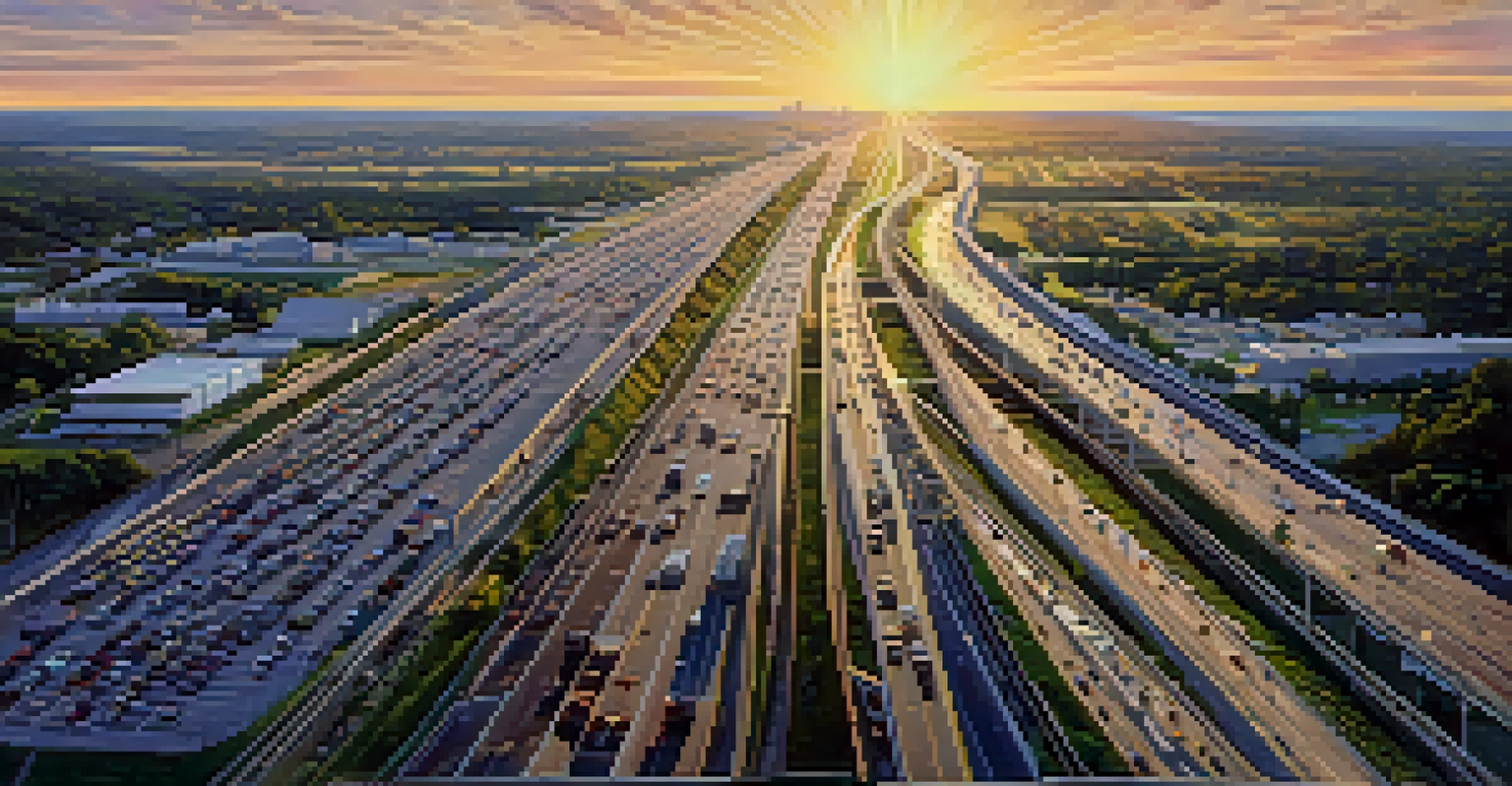New Jersey's Major Highways: Connecting Cities and Regions

The Backbone of New Jersey: An Overview of Major Highways
New Jersey's highway system is a complex network that plays a crucial role in connecting its vibrant cities and regions. Major highways such as the Garden State Parkway and the New Jersey Turnpike serve as vital arteries for transportation, commerce, and tourism. These routes not only facilitate daily commutes but also support the movement of goods across the state, impacting the economy significantly.
The road to success is always under construction.
With over 2,000 miles of state highways, New Jersey boasts one of the most extensive road systems in the nation. This impressive infrastructure enhances accessibility, making it easier for residents and visitors alike to navigate the state. Whether you're heading to the Jersey Shore or traveling to New York City, these highways ensure a smooth journey.
Moreover, the strategic placement of these roads has fostered regional development. Areas that were once remote have blossomed into bustling towns and commercial hubs, thanks to the accessibility provided by these thoroughfares. Thus, New Jersey's highways are not just roads; they are pathways to opportunity.
The Garden State Parkway: A Scenic Route Through New Jersey
One of the most iconic highways in New Jersey is the Garden State Parkway, known for its scenic views and convenient access to various attractions. Stretching over 172 miles, this highway runs from the northern reaches of the state down to Cape May, making it a favorite among travelers. Along the way, it offers glimpses of picturesque landscapes, charming towns, and recreational areas.

The Parkway is more than just a beautiful drive; it also serves as a vital link for commuters. Many residents rely on this highway for daily travel to work or school, making it an essential part of their routines. Its well-maintained rest areas provide a perfect spot for a quick break, allowing travelers to recharge before continuing their journey.
Highways Drive New Jersey's Economy
New Jersey's major highways are crucial for commerce, facilitating the efficient movement of goods and connecting key urban areas.
Additionally, the Garden State Parkway is a key route for vacationers heading to the shore. During the summer months, it becomes a bustling thoroughfare, filled with families eager to enjoy New Jersey's beautiful beaches. This highway not only connects places but also creates memorable experiences for those traveling along its path.
New Jersey Turnpike: The Lifeline of Commerce
The New Jersey Turnpike stands as a monumental feat of engineering that significantly impacts the state’s economy. Spanning 122 miles, it connects major cities like Newark, Trenton, and Camden, making it an essential route for commercial transport. With over 150 million vehicles using it annually, the Turnpike is a lifeline for businesses and industries throughout the region.
Life is a journey, not a destination.
This highway is particularly crucial for freight transport, as it links to several major interstate highways, including I-295 and I-95. This connectivity allows for efficient movement of goods not just within New Jersey but also to surrounding states. Businesses benefit from reduced travel times, which in turn enhances their competitiveness in the market.
Moreover, the Turnpike's service areas provide essential amenities for long-distance travelers and truck drivers. These well-equipped stops allow for easy refueling and quick meals, ensuring that drivers remain energized. Thus, the New Jersey Turnpike is not just a road; it is a vital component of the state’s economic framework.
Connecting Communities: Local Highways and Their Impact
While major highways often steal the spotlight, local highways play an equally crucial role in connecting communities throughout New Jersey. These roads facilitate access to neighborhoods, schools, and local businesses, ensuring that residents can easily engage with their surroundings. Local highways are the veins that nourish the state's social fabric.
For example, Route 130 runs parallel to the Delaware River and connects towns from the northern to southern parts of the state. This route not only provides a scenic drive but also supports local commerce by linking shops and restaurants. Residents often prefer these local highways for shorter trips, creating a sense of community along the way.
Tourism Thrives on Scenic Routes
The state's highways provide easy access to popular attractions, boosting tourism and benefiting local businesses.
Moreover, local highways often reflect the character of the areas they serve. With unique shops and eateries lining the roads, they offer a glimpse into the local culture. As such, these highways foster connections not just between destinations but also between people, making New Jersey a more cohesive place to live.
The Role of Highways in New Jersey's Tourism
New Jersey's highways are pivotal in promoting tourism, drawing visitors from all over the country. Major routes lead to attractions such as the iconic Atlantic City Boardwalk, historic sites in Philadelphia, and the beautiful beaches of the Jersey Shore. The ease of access provided by these highways makes it simple for tourists to explore the diverse offerings of the state.
The influx of visitors creates a vibrant economy, benefiting local businesses, hotels, and restaurants. Seasonal events and festivals, often advertised through highway signage, attract even more tourists, enhancing the state's appeal as a travel destination. This symbiotic relationship between highways and tourism fuels New Jersey’s economy and cultural vitality.
Additionally, the scenic routes available for exploration allow tourists to experience New Jersey’s natural beauty. From the lush Pine Barrens to the stunning views along Route 9, these highways provide more than just a means to get from point A to point B; they offer a journey filled with memorable experiences. As such, highways serve as gateways to adventure in the Garden State.
Environmental Considerations of New Jersey's Highways
While highways are essential for connectivity, they also pose environmental challenges that New Jersey must address. Increased traffic leads to higher emissions, which can negatively impact air quality and contribute to climate change. The state is actively working to balance transportation needs with environmental stewardship, striving for a more sustainable approach to highway management.
Initiatives such as the planting of trees along highways and the development of eco-friendly rest areas demonstrate New Jersey's commitment to reducing its carbon footprint. These efforts not only enhance the aesthetic appeal of highways but also provide habitats for local wildlife. By incorporating green practices, New Jersey is setting an example for other states to follow.
Sustainable Innovation in Transportation
New Jersey is embracing technology and eco-friendly practices to enhance highway infrastructure while addressing environmental concerns.
Moreover, public transportation options are being integrated with highway systems to reduce reliance on personal vehicles. Investments in bus and rail services aim to alleviate congestion and lower emissions. Through these multifaceted approaches, New Jersey is working towards a future where highways contribute positively to both transportation and the environment.
Future Developments: Innovations in Highway Infrastructure
As technology advances, New Jersey's highways are set to benefit from innovative developments aimed at improving safety and efficiency. Smart highway systems, which utilize sensors and real-time data, can help manage traffic flow and reduce congestion. These enhancements not only make travel more efficient but also improve overall road safety for drivers and pedestrians alike.
Additionally, the introduction of electric vehicle (EV) charging stations along major highways is a significant step towards promoting sustainable transportation. By providing accessible charging options, New Jersey is encouraging residents and visitors to adopt greener vehicles, further contributing to environmental goals. This infrastructure development signals a commitment to modernizing the state's transportation system.

Furthermore, future projects may include the expansion of public transportation options and the enhancement of bike lanes connected to highways. These initiatives will promote alternative modes of transport, encouraging a shift away from single-occupancy vehicles. Through these forward-thinking strategies, New Jersey aims to create a more connected and sustainable transportation network.
Conclusion: The Importance of Highways in New Jersey
In conclusion, New Jersey's major highways are not merely routes for vehicles; they are essential lifelines that connect communities, foster economic growth, and enhance tourism. The synergy between these highways and the state's vibrant culture makes them a vital component of daily life. By understanding their significance, we can appreciate the role they play in shaping New Jersey's identity.
As infrastructure continues to evolve, the state is committed to addressing environmental concerns and embracing technological innovations. These efforts will ensure that New Jersey's highways remain safe, efficient, and sustainable for generations to come. By investing in these vital roadways, the state underscores its dedication to its residents and visitors alike.
Ultimately, New Jersey's highways reflect the dynamic nature of the state itself. They are pathways of opportunity, adventure, and connection, reinforcing the idea that travel is not just about reaching a destination, but about experiencing the journey along the way.